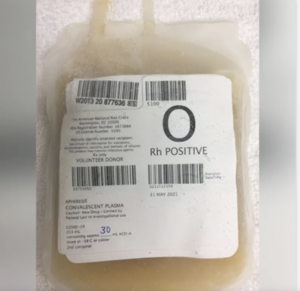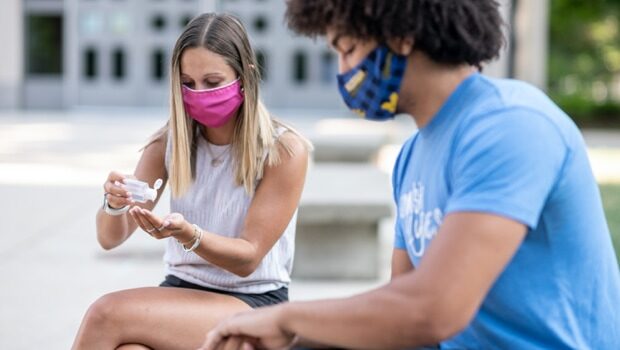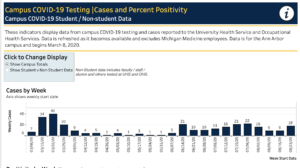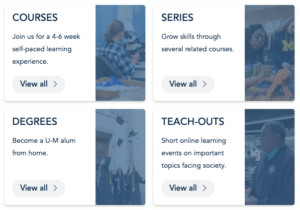Here we go
It’s fall 2020 and coronavirus is still raging. This page is in no way comprehensive, but it offers a number of campus-wide links to news and feature stories, helpful tips, free courses, and Q&As related to COVID-19. We suggest you visit Michigan Medicine and the School of Public Health for even more information. The Michigan Health and Michigan Lab blogs have published an extensive directory of stories related to the coronavirus.
Safeguarding our semester together
A message from President Mark Schlissel to U-M students
The beginning of the academic year is here, and many of you are moving to Ann Arbor or settling into your new homes for the semester. We know that this is an exciting time for you, and we share your enthusiasm and hopes for a successful fall semester.
Those of you coming to Ann Arbor will see the results of an incredible amount of preparation … Together, we have created an opportunity that allows you to get the most out of your University of Michigan experience during the COVID-19 pandemic. But we will not succeed without your help and commitment – and we’re proud to join together in sharing the importance of our collective effort. (Keep reading.)
Campus Life
Campus Maize & Blueprint — COVID-19 Dashboard
U-M’s Ann Arbor campus has created a dashboard to provide regular updates to the community about the state of COVID-19 on campus.
The dashboard includes cumulative data about the total number of tests and the total number of cases, information about positivity rates, and isolation numbers since March 8. Additional information is provided on state and regional trends. (Keep reading.)
U-M launches Wolverine Culture of Care, Michigan Ambassadors
Wearing face masks and practicing social distancing is not what comes to mind when many young college students envision their college experience.
But in the midst of the COVID-19 pandemic, the 2020 fall semester is going to look and feel very different for everyone.
To help keep the campus and broader community as healthy and safe as possible, U-M has launched the Wolverine Culture of Care — an initiative aimed to provide education on health-promoting behaviors and promote collective responsibility and positive social norms related to the virus.
Student Life also has launched the Michigan Ambassador program, a student-centered health initiative designed to promote COVID-19 safety protocols. (Keep reading.)
U-M researchers look for coronavirus in campus environment, potential links to infection risks
Researchers at U-M’s School of Public Health are studying samples from sewers, wiping down classrooms and buses, and taking measurements of air to determine how much coronavirus is present in the environment on campus, and whether that has any relationship on COVID-19 infection rates within the university community.
They hope this approach will provide an additional perspective from the work of other researchers, which has focused mostly on epidemiological approaches such as tracking infection rates.
“By making measurements before the start of the semester, and then continuing to sample the same locations over time as students, staff, and faculty come back to campus, we can see how the amount of virus in the environment relates to infection rates,” says Rick Neitzel, U-M associate professor of environmental health sciences. “The two must be related, but nobody has looked at this yet.” (Keep reading.)
Safe busing during COVID-19: The science behind U-M’s changes
In an effort to design a safe campus bus system for the fall semester in light of COVID-19, U-M researchers simulated how aerosol particles exhaled from passengers sitting in any seat would travel through the vehicle under different conditions.
That’s just one facet of the broad-based work engineering researchers have undertaken in recent months to quantify risks and provide data to inform university busing decisions.
In addition to developing physics-based computer models of aerosol dispersion — and validating them with experiments using water vapor — they also used algorithms to overhaul routes, reducing passengers’ time on buses to minimize possible exposure to the virus. The university’s bus fleet provided an estimated 8 million rides between its three Ann Arbor campuses last year. (Keep reading.)
Leaders encourage students to act safely in new semester
U-M leaders are urging students returning to the Ann Arbor campus for the fall semester to follow social distancing guidelines, wear face coverings, and stay home when sick to preserve as much in-person instruction as possible.
An Aug. 24 email message to all Ann Arbor students was signed by President Mark Schlissel; Susan Collins, provost and executive vice president for academic affairs; Martino Harmon, vice president for student life; Amanda Kaplan, president of Central Student Government; and Saveri Nandigama, vice president of CSG.
The message outlined how campus leaders collaborated with health experts, students, and local community members to prepare for the return of students during the COVID-19 pandemic and how students play a role in keeping the campus safe. (Keep reading.)
Frustrated with fall reopening, faculty members consider vote of no confidence in administration
On Aug. 28, The Michigan Daily reported U-M faculty members are considering a vote of no confidence in the administration due to the University’s response to the COVID-19 pandemic and fall reopening plan. Faculty members held an emergency Faculty Senate meeting Friday. The meeting came a few days after a July 31 memo to President Schlissel from the President’s Advisory COVID-19 Committee on Ethics and Privacy was inadvertently made public and began circulating online, sparking criticism toward the University administration. (Keep reading.)
Health and Wellness
Vaccine Q&A: From Flu to COVID-19, Everything you need to know
Families are restricted from visiting hospitalized loved ones. What does this mean for at-home care?
While necessary to help prevent the spread of COVID-19, an unintended side effect of barring hospital visitors during the pandemic has been families’ loss of learning how to care for ill or injured loved ones at their bedside. In collaboration with a large team of researchers, doctors, nurses, and health care providers, U-M’s Richard Gonzalez is studying how family caregivers are impacted by losing this bedside education. The study is called HEART.
Gonzalez is the center director of the Research Center for Group Dynamics at the Institute for Social Research and the Amos N. Tversky Professor of Psychology and Statistics and professor of marketing, and integrative systems and design. (Keep reading.)
COVID poses hardships for people with substance abuse problems
Both fatal and nonfatal overdoses have increased this year compared to last, according to a recent report by the Overdose Data Mapping Application Program. And, anecdotal information suggests that compared to last year, people in recovery are relapsing at alarming rates.
Faculty from the U-M School of Nursing’s Center for the Study of Drugs, Alcohol, Smoking and Health discuss why the pandemic has hit people with substance abuse problems especially hard and the expanded role of virtual recovery programs. (Keep reading.)
Podcasts and Web Series

The 8/26 episode of the Michigan Medicine Newsbreak podcast is titled “Testing the Efficacy of Convalescent Plasma in Treating COVID-19.” |
Population Healthy
Population Healthy is a weekly podcast that digs into important public health topics that impact our everyday lives. Produced by the U-M School of Public Health, the show brings together experts to discuss population health issues from a variety of perspectives — from the microscopic to the macroeconomic, the social to the environmental — and to explore the factors that affect the health of all of us at a population level.
Thrive with Your Family
Join this nationally recognized panel of experts for candid conversations about parenting, child behavior, mental health, and relationships during the ever-changing environment of our current global pandemic. They tackle the stressors, concerns, and difficulties families are facing. The goal is to foster a sense of hope and understanding and provide tips for maintaining a problem-solving mindset even amidst circumstances that can feel out of our control.
The Michigan Medicine News Break
This daily briefing gives an insider’s perspective on cutting-edge research news, practical health information, and inspiring stories of survival and overcoming incredible odds. All News Break content, including health news, best practices, and research insights, are for informational purposes only and are not a substitute for professional, personalized medical guidance.
Research news
Coronavirus testing, immunity, and what we know
Questions around coronavirus testing and immunity are top of mind as the pandemic continues to spread and potential vaccines undergo trials. Emily Toth Martin, associate professor of epidemiology at U-M’s School of Public Health, breaks down the basics of coronavirus testing and what the current data show are the potential next steps for the U.S. as we head toward fall 2020 and flu season. (Keep reading.)
AI, supply chain management, and a COVID-19 vaccine
It’s 2021, and the world has a safe vaccine for COVID-19 as well as drugs to treat the disease. But now, we face a serious problem: How do we make billions of doses of the medicines? Researchers fear that the same issues with supply chains that caused toilet paper shortages at the beginning of the pandemic in the U.S. may result in the same problem with the fine chemicals needed to synthesize COVID-19 therapeutics and vaccines. (Keep reading.)
U-M spinout Asalyxa Bio developing inflammatory treatment platform, aiding COVID-19 patients
Asalyxa Bio, a startup with neutrophil-targeting drug-delivery technology invented at U-M, has secured seed funding to advance toward the first in-human trials next year. Asalyxa Bio was co-founded by U-M scientists and Orange Grove Bio, a New York-based venture operating company. The company’s chief scientific officer is Lola Eniola-Adefeso, who was among the few Michigan researchers working during the depths of the lockdown because her group was making progress on a treatment for Acute Respiratory Distress Syndrome (ARDS), including the variety found in COVID-19 patients. (Keep reading.)
Free courses, activities, exhibits offered by U-M
At home during the Coronavirus pandemic? Visit this wide-ranging resource from Michigan News, which features online learning opportunities you can enjoy right now.
In addition, U-M’s art and performance organizations and its libraries have many exhibits, performances, speakers, and other enriching resources online. Museums, galleries, and units across campus are currently working to create online content to assist K-12 and college learners. Stay up to date at arts.umich.edu
Through Michigan Online, U-M has several online learning opportunities for those who want to try something new, sharpen an existing skill, or just be enriched. U-M has a portfolio of more than 180 online learning opportunities.
Use Coursera.org/umich to start streaming on-demand video lectures today from top instructors in subjects like business, computer science, data science, language learning, and more.




